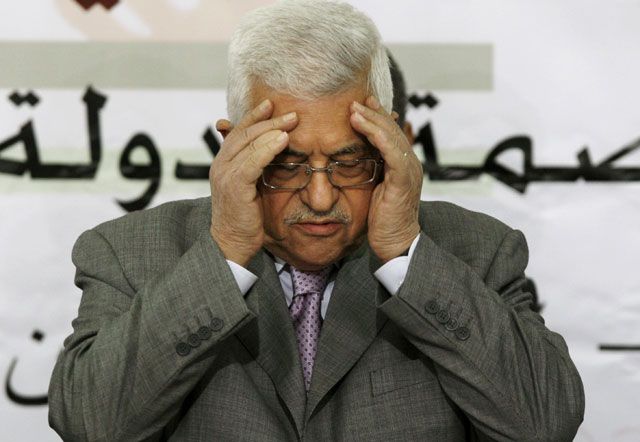Ramallah: Many Western diplomats do not believe Palestinian President Mahmoud Abbas will follow through with his decision not to rerun in upcoming elections and would change his mind if he was presented with ideas that allow him to resume talks with Israel with dignity. Although the decision came as a shock to Palestinian supports of Abbas, western diplomats were informed a few days prior of Abbas’ decision. Under US pressure, Abbas stopped short of announcing the death of a two-state solution during his speech late on Thursday.
Israel has largely kept silent over Abbas’ announcement, but Israeli lawmakers say it is in the interest of the Jewish state to keep Palestnians divided. However, Israeli officials are weary over a possible Hamas take over of the West Bank, if Abbas quits or is further weakened. Hamas enjoys a strong pressence in the West Bank, and described Abbas decision as an admission of failure of his policies.
Supporters of Palestinian President Mahmoud Abbas poured to the streets of Ramallah chanting slogans in support of their leader and urging him to reconsider his decision not to seek re-election in upcoming elections immediately after his announcement late on Thursday.
Abbas’ frustration with the way the US administration was handling the peace process and the issue of Jewish colonies has been building up since September when US President Barack Obama asked the Palestinians to drop conditions to resuming final status negotiations with Israel, notably the demand to halt all colony construction in the occupied West Bank.
Last week’s statements by US Secretary of State Hillary Clinton that a halt on Israel’s colony construction was not a pre-condition for the resumption of talks and that Israel’s willingness to partially freeze colonies was "unprecedented" angered the Palestinians and confirmed Abbas’ concerns that the new US administration under Obama would not play the honest broker he had hoped it would.
"We were optimistic when President Obama announced the need for a complete halt to colonies, including natural growth," Abbas said in a speech on Thursday night announcing his decision not to run in elections planned for January 24, 2010.
"We were surprised by his (later) support for the Israeli position," he said in his first public criticism of the United States.
Abbas may have come to the conclusion that if the US has failed to deliver on a colony freeze, it would not be able to convince Israel to pay a price for a final peace.
"I have informed brethren in the PLO Executive Committee and the Fatah Central Committee that I do not wish to present my candidacy in the upcoming presidential election," he said.
The Palestinian leadership announced its rejection of his decision and appealed to him to run. Fatah officials said he would remain their only candidate for the next election.
Abbas insisted that his position was neither a political maneuver nor a bargaining position. He said the stalemate in the peace process, the US position in handling the peace process and Israel’s intransigence were behind his decision. He also expressed bitterness at his Islamist rival Hamas which has refused to sign an Egyptian-mediated unity deal to end the split between the West Bank and Gaza and accused them of putting their factional interests before that of the Palestinian people.
"He has thrown the towel. His decision is not a tactic," top Palestinian negotiator Saeb Erekat said. Hamas officials criticized Abbas’ move as a tactic.
"Abbas speech was bankrupt and an admission of the failure of his political settlement strategy with the Zionist entity," Hamas spokesman Fawzi Barhoum was quoted on Hamas’ website.
The US vowed to continue working with Abbas despite his decision. "We have tremendous respect for President Abbas. He has an important and historic leader for the Palestinian people and a true partner for the United States," White House spokesman Robert Gibbs told reporters.
"He has worked to better the lives of Palestinians. I would simply say that whatever he decides, we look forward to continuing to work with him and to continue in that collaboration to make the lives of Palestinian better," Gibbs said.
Aides interpreted these remarks as a sign that the US believed Abbas’ move was a tactic. Abbas, 74, has made peace his strategy. He was elected in 2005 after Yasser Arafat’s death on a peace platform. Negotiations were his only strategy. His rejection to revert to violence as an option lost him popularity and strengthened his Islamist rivals.
Aides said Abbas feels he has been abandoned by the Arabs, by the international community, and the US. In his speech, Abbas said more measures would later be announced and he warned that the two-state solution was in jeopardy.
"The two-state solution with Israel and Palestine living side-by-side in peace and security is still possible," he added. "The two-state solution these days is facing dangers and we don't know where it would lead."
Erekat said the Palestinian leadership’s option remained a two-state solution but warned that if colony expansion continued, the two-state solution would no longer work as an option.
Another senior aide said Abbas was on the verge of announcing the death of the two-state solution but heavy pressure from Washington made him tone down his words.
Abbas’ move throws the peace process into uncertainty and puts the Israeli government in disarray. Israel rejects the notion of a one-state solution that would make the Arabs the majority. If Abbas quits, Hamas, which is already strong in the West Bank, would be further strengthened and the peace strategy would be served a deadly blow.
Arab League Chairman Amr Mousa and international leaders telephoned Abbas following his speech to ask him to reconsider his position but Palestinian aides said the Arab League’s refusal to lean on Hamas to end the split compounded Abbas’ problems.
"The only thing that might get Abbas to reconsider his position would be to give him something that would enable him to return to the negotiations. Abbas insists that nothing less than a total colony freeze and clear terms of reference for peace talks would make him change his mind," a senior aide said.
Another aide, Nabil Abu Rdainah said "the only way out of this crisis and deadlock is to force Israel to implement international legitimacy and for the United States to change its positions regarding resumption of the negotiations."
"The president is disappointed. The American policy in the region must change," Abu Rdainah said.
- Wafa Amr is a Palestinian journalist based in Ramallah.













